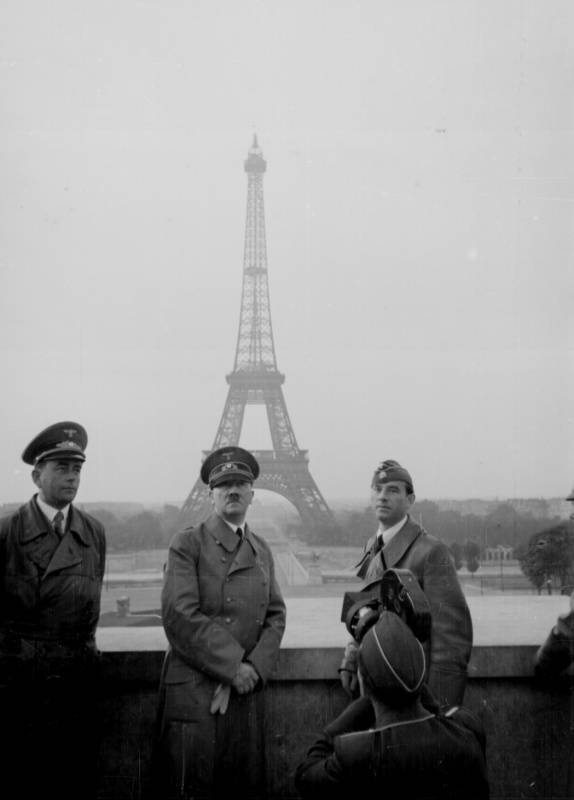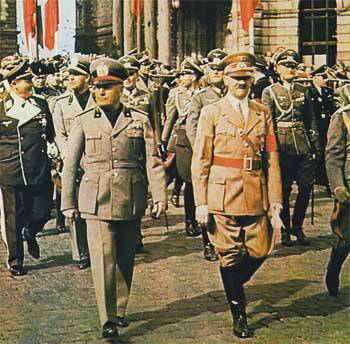Mobilization of German forces to attack the USSR
As a result, significant geopolitical shifts took place in Europe: if before the defeat of the Anglo-French-Dutch-Belgian troops in Europe there were three forces - the USSR, the Reich and the alliance of England and France, now there are only two left - the USSR and the Reich. England itself was not a center of power, able to resist Germany, moreover the Anglophilian moods in the leadership of the Reich were not strong, they did not want to kill her. So, Manstein wrote: "It can be said with absolute certainty that Hitler would have preferred to avoid war with the British Empire, since his main goals were in the east." 2 June 1940, at the headquarters of Army Group A, Adolf Hitler said that after the French campaign and the expected "reasonable peace agreement" Germany would finally have "freedom of action" for its "big and real task: collision with Bolshevism."

Adolf Hitler, with his entourage, poses against the backdrop of the Eiffel Tower in Paris in 1940. Left: Albert Speer, Hitler’s personal architect, the future Reich Minister of Defense Industry and Armaments. On the right is sculptor Arno Becker. Shooting time: 23.06.1940.
Hitler was supported by the Reich financial and industrial community, at the end of May 1940, the Society for European Economic Planning and Economics, which included major industrialists, officials and representatives of the Wehrmacht, made a conclusion. Later it was included in the outline of the “Program for the development of the continental European economy in a vast territory under German administration” (one should not forget that Hitler was one of the designers of the idea of “United Europe”). These programs provided for the exploitation of the peoples of the territory from Gibraltar to the Urals, from North Cape in the north to the island of Cyprus in the south, while maintaining colonizing influence in Siberia and Africa. Another similarity of modern Russia, Europe, the position of the African continent with the plans of Hitler.
This is confirmed by the German authors as well, K. Tippelskirkh noted: “Since the summer of 1940, the idea of destroying the power of the Soviet Union has become an integral part of Hitler’s plans for further warfare. I must say that this thought long before its implementation was the determining factor of its strategy. ” Preparing for war with the Soviet Union is becoming the pivotal direction of events held in Germany in the army, the economy, and domestic policy. To this end, they also abandoned large-scale programs for building up and improving the naval forces, focusing all their attention on ground forces.
29 June 1940, the decree of the commander of the German Land Forces, Brauchitsch, marked the beginning of the creation of a strike force group in the east. Began to develop a plan for the transfer of mobile connections to the east. July 19 Hitler in Parliament officially offered England peace, but the British government did not go to him. It was necessary to finally decide whether to continue simultaneously preparing for the invasion of the British Isles or concentrate on preparing for war with the USSR. At the same time, the transfer of armored vehicles to the east begins, additional roads are being built.
As a result, they decided to leave the issue with England for later, although officially, right up to the attack on the USSR, they imitated the stormy preparations for the landing operation. 31 July 1940 of the year at a military meeting, Hitler said that Britain will hold only with the United States and the Soviet Union, if the Soviet Union collapses, then the United States will not fully support London, since Japan will sharply increase in the Asia-Pacific region at the expense of the Union. Therefore, Russia must be eliminated, the attack must follow no later than the spring of 1941. “The operation will be meaningful only if we destroy the entire state with one swift blow. Just capturing some part of the territory is not enough. ”
Preparing for an attack on the USSR, Berlin relied on the full power of the states it had seized: 5 thousand steam locomotives, 250 thousand wagons were stolen from France in two years of occupation; in 1941, the Germans exported 4,9 million tons of ferrous metals from France (i.e. 73% of France's annual production). In 1940, the Wehrmacht took almost all the weapons and equipment - 6 Norwegian, 12 English, 18 Dutch, 22 Belgian, 92 French divisions, only in France they captured 3 thousand aircraft and about 5 thousand. tanks. Due to the French and other trophy vehicles, 90 divisions were equipped. This is not taking into account Czech tanks and other weapons of the Czechoslovak military-industrial complex.
In 1940, the growth of military production in Germany amounted to almost 54%. In August, 1940 was decided to bring the number of divisions in the army to 180, by the beginning of the war the Wehrmacht, together with the reserve army and the SS forces, should have had 250 fully operational, equipped divisions. Increasing the number of mobile units: September 5 in the Directive of the Wehrmacht High Command (OKW) for the accelerated deployment of wartime armies increased the number of motorized divisions to 12, and tank divisions to 24. The most important priority was the release of the latest weapons for aviation, artillery, tank forces.
True, the idea of the Blitzkrieg left a negative imprint on the preparation of war with the USSR - they were preparing for a “hit, win” war, and not to the possibilities of total war. Germany and the captured countries mobilized, but in the light of the “blitzkrieg”. As a result, the economic factor of the war with the USSR was underestimated. It was believed that the accumulated weapons, ammunition was enough for a quick victory, so the scenario of a significant expansion of production during the war was not calculated. This factor could lead the Wehrmacht to serious consequences and led. In addition, the issue of material support and supply has become a secondary problem, they say, there will be enough cash.
Although the power of the Wehrmacht has increased significantly, and Hitler was confident in the success of the lightning war. The Wehrmacht received a vast experience in conducting fast-moving offensive operations, a maneuverable war, the command and control system was tested in wars, the Luftwaffe had the greatest experience in waging an air war - even from the Spanish war. The rear of the Armed Forces was formed and successfully operated; transport and the message system could quickly carry out large-scale military transportation.
Diplomatic training
In the war with Poland, only Slovakia took the side of Germany, in the French campaign, when it became clear that France had been defeated, Italy had participated. The war with the USSR was originally conceived as a “crusade to the East”, with the wide participation of allied states and European citizens from conquered countries.
Thus, according to the plans of Berlin, Japan was to perform in the East of the USSR, holding down significant ground forces, aviation units of the Red Army. In addition, she had to divert the United States from actions in Europe, to distract England - threatening its possessions in Asia and the Pacific. The main efforts of Italy were to be directed against England: so, in July 1940, the Italian army from Ethiopia launched an offensive against Egypt. September 27 The Tripartite Pact was signed between Berlin, Rome and Tokyo on September 1940, its ultimate goal was to conquer world domination. For the purpose of misinforming Moscow, it was said that the treaty does not affect the political relations between its participants and the Soviet Union.
In addition, the states of South-Eastern Europe were involved in aggression against the USSR. In Romania, a coup was carried out, the power was received by a supporter of the alliance with Berlin, General I. Antonescu. In November 1940, Romania, Hungary, Slovakia entered into the Tripartite Pact. March 1 1941 in Vienna, an agreement was signed on the entry of Bulgaria into an alliance with the countries of the Tripartite Pact, and German troops entered Bulgaria. Although Bulgaria had so far hypocritically assured Moscow of good feelings. Involved in the alliance against the Soviet Union Finland: 22 September 1940, a secret agreement was concluded on the transportation of German forces and materials to Norway, through Finnish territory. Under this agreement in Finland began to deploy the German grouping of troops to attack the USSR. The Finnish elite was promised to be handed over to Eastern Karelia, the Leningrad Region for the participation of the Finnish army in the war with the USSR. Thus, Germany managed to expand its strategic capabilities by threatening the USSR on the huge border from the Black Sea to the Arctic Ocean, along the entire western, European border of the USSR. Significant military forces (divisions of Finland, Hungary, Romania, Italy, etc.) were involved in the war against the Soviet Union, not counting volunteers from countries captured by Germany, where entire brigades and divisions were formed. Plus the economic resources of these countries, including the oil fields of Romania.
True, Moscow managed in 1941 to conclude an agreement on neutrality with Japan, effectively neutralizing Germany’s most dangerous potential ally. In Tokyo, make the final decision to develop the expansion in the southern direction.
Berlin "covered" and its southern flank - for this were organized invasions of Greece and Yugoslavia. Initially, only Italy invaded Greece, but the Greek army inflicted a series of defeats on it, Berlin "helped" an ally. In Yugoslavia, under pressure from Berlin, the 25 government in March, 1941, joined the Tripartite Pact, but people began to resist. On March 27, a group of officers revolutionized and overthrew the pro-fascist government. This led to the strike of the Third Reich. As a result, Yugoslavia and Greece were occupied.

Sources of:
Blair, V., Drechsler, K., Förster, G., et al. Germany in World War II (1939-1945). M., 1971.
History diplomacy. M., 1975. T. 4.
http://militera.lib.ru/memo/german/manstein/index.html
http://militera.lib.ru/h/tippelskirch/index.html
http://militera.lib.ru/db/halder/index.html
Information